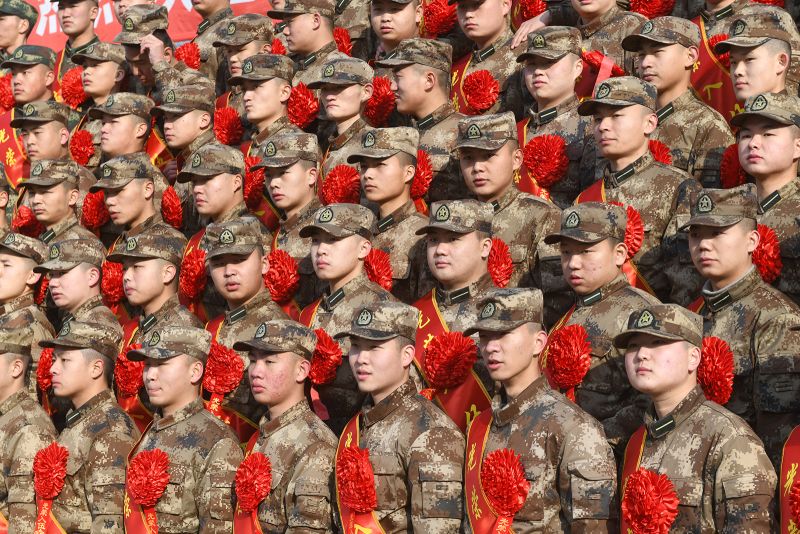
The Expulsion of a Leading Rocket Scientist from China's Political Advisory Body

A closer look at the recent expulsion of a prominent rocket scientist from China's top political advisory body and its implications for the nation's military-industrial complex.
The Expulsion
In a surprising turn of events, China has made headlines with the expulsion of a leading rocket scientist from its top political advisory body. The removal of Wang Xiaojun, a prominent figure in the field of rocket design and space technology, has sparked widespread speculation and raised questions about the motives behind this unprecedented decision.
A total of 137 students directional trained for the People's Liberation Army (PLA) Rocket Force participate in a see-off ceremony at Fuyang Institute of Technology and will set off for barracks on December 26, 2021 in Fuyang, Anhui Province of China.
The Chinese Peoples Political Consultative Conference (CPPCC) took the drastic step of removing Wang Xiaojun, 54, at a meeting in Beijing, sending shockwaves through the scientific and military communities. This move comes just a year after Wang's appointment as a member of the CPPCC, marking a swift and unexpected downfall for the esteemed rocket scientist.
Wang Xiaojun, renowned for his instrumental role at the China Academy of Launch Vehicle Technology (CALT), has been a key figure in advancing the nation's aerospace industry. As the former leader of CALT, Wang's contributions to the development, testing, and production of missile weapons and launch vehicles have been widely acknowledged and celebrated. The sudden and unexplained nature of his dismissal has left many baffled and searching for answers.
The expulsion of Wang Xiaojun is just the latest in a series of shakeups within China's military-industrial complex. This trend of removals and oustings has raised concerns about the underlying causes and the impact on the nation's strategic programs and initiatives.
Implications for China's Military-Industrial Complex
The expulsion of Wang Xiaojun from the CPPCC has sent ripples of uncertainty through China's military-industrial complex. As a leading figure in the field of rocket design and space technology, Wang's abrupt removal has cast a shadow over the strategic direction and leadership of key institutions involved in the nation's missile force and aerospace development.
The China Academy of Launch Vehicle Technology (CALT), under Wang's leadership, has long been regarded as a cornerstone of the nation's aerospace capabilities. The sudden void left by Wang's expulsion raises concerns about the continuity of critical projects and the stability of the institution's research and development efforts.
Moreover, Wang Xiaojun's dismissal is part of a broader pattern of expulsions and removals within the Chinese military-industrial complex. The recent purges and oustings of high-ranking officials have fueled speculation about the underlying reasons, with experts pointing to potential corruption and misconduct within the highly secretive and lucrative field of missile development and procurement.
The implications of these developments for China's military-industrial complex are far-reaching, as they raise questions about the integrity, transparency, and stability of the nation's strategic programs and initiatives. The sudden removal of key figures like Wang Xiaojun has sparked debates about the future trajectory of China's aerospace and defense capabilities.
The Legacy of Wang Xiaojun
Wang Xiaojun's legacy as a pioneering figure in China's aerospace industry cannot be understated. His instrumental role in leading the development of the Long March 7, a new-generation rocket designed for launching cargo spacecraft to China's Tiangong space station, has left an indelible mark on the nation's space exploration endeavors.
Wang's distinguished career, spanning nearly three decades at the China Academy of Launch Vehicle Technology, has been marked by significant achievements and contributions to the advancement of China's space program. His leadership and expertise have been pivotal in shaping the nation's capabilities in missile technology and launch vehicle development.
Notably, Wang Xiaojun's public endorsements and accolades, including commendations from state authorities and recognition for his strategic vision, underscore his profound impact on China's aerospace science and technology landscape. His unwavering commitment to advancing China's position as a formidable aerospace nation has resonated across the scientific and military communities.
Despite the unexpected turn of events leading to his dismissal, Wang Xiaojun's legacy as a trailblazer in China's aerospace industry endures. His contributions, vision, and dedication to the nation's space exploration ambitions continue to serve as a testament to his lasting influence and impact.







